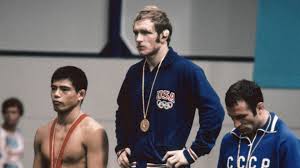In the world of sports, few names command as much reverence and awe as Dan Gable. More than just a champion wrestler or successful coach, Gable is a symbol of relentless determination, mental toughness, and the belief that greatness comes from total commitment. His legacy stretches far beyond the wrestling mat he changed how the sport was seen, taught, and respected in America.
The Making of a Champion
Born on October 25, 1948, in Waterloo, Iowa, Dan Gable was introduced to wrestling at a young age. But his life took a tragic turn at age 15 when his older sister, Diane, was murdered in their family home. This devastating event became a defining moment for Gable. Rather than breaking him, it ignited a fire within him a drive to never lose focus, never give up, and never waste a moment.
That mindset carried him through a phenomenal collegiate career at Iowa State University, where he posted a nearly perfect 117–1 record. His single loss, in the NCAA finals during his senior year, was to Larry Owings a match that stunned the wrestling world. But true to his nature, Gable turned the loss into fuel for the future, using it as motivation to become even better.
Olympic Glory and Unbreakable Will
In 1972, at the Munich Olympics, Dan Gable reached the pinnacle of his competitive career. Representing the United States, he won the gold medal in freestyle wrestling and did so without surrendering a single point. That dominant performance wasn’t just rare it was historic. It showcased the peak of what human discipline, grit, and preparation could achieve.
His Olympic performance earned him global respect and permanently etched his name into the annals of sports greatness. Yet even then, Gable was just getting started.
The Coaching Dynasty
After retiring from competition, Gable turned to coaching, and it was here that his impact on the sport truly exploded. As the head coach of the University of Iowa wrestling team from 1976 to 1997, Gable built an unprecedented dynasty.
Under his leadership, Iowa won 15 NCAA team championships, including 9 consecutive titles from 1978 to 1986 a feat unmatched in collegiate wrestling. He coached 152 All-Americans, 45 national champions, and 12 Olympians. But beyond the numbers was a culture of excellence that became the gold standard for wrestling programs nationwide.
Gable’s coaching style was intense, demanding, and deeply personal. He taught his wrestlers not just how to win matches, but how to overcome adversity, outwork opponents, and develop mental resilience. His practices were famously grueling but his athletes revered him because he pushed them further than they thought possible.
A Legacy Beyond the Mat
Dan Gable’s influence stretches far beyond the wrestling room. He helped elevate wrestling’s status in the U.S., making it a respected collegiate sport and advocating for its place on the Olympic stage. His leadership, discipline, and dedication became a blueprint not just for athletes, but for coaches and competitors across all sports.
In 2020, Gable was awarded the Presidential Medal of Freedom, one of the highest civilian honors in the United States. It was a fitting tribute to a man whose life has been a testament to resilience, hard work, and the power of sport to transform lives.
The Standard of Greatness
Dan Gable is more than a sports icon he’s a symbol of what it means to devote yourself fully to a craft. Through personal tragedy, physical exhaustion, and fierce competition, Gable proved that success is not reserved for the most talented, but for those most willing to suffer, grow, and persist.
He didn’t just change wrestling. He raised the standard for what an athlete and a human being can achieve when they refuse to quit.

